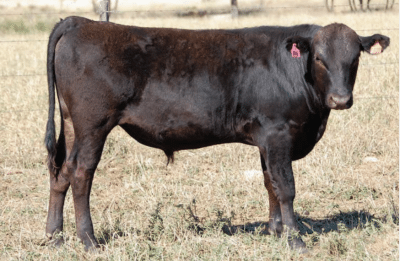IN A week when our genetics review topic is selection for polledness in Brahman cattle, it’s an extraordinary coincidence that we’re also highlighting what is believed to be the world’s first sale of Poll Wagyu genetics.
A breeding syndicate called Polled Wagyu Pty Ltd will offer 20 young purebred Wagyu bulls, all tested heterozygous polls, at auction near Mackay in Central Queensland next month.
Beef Central profiled the Poll Wagyu syndicate’s genetic progress in this earlier article, published in May.
The project involves three parties – brothers Keith and John Hammond from Hammond Brothers Robbins Island, Tasmania; Scott de Bruin from Mayura Wagyu in South Australia; and Central Queensland cattleman Darren Hamblin from Strathdale Wagyu near Sarina.
The process started when the Hammond brothers initially AI’d 1500 Angus females to Bar R 52Y – one of the only heterozygous poll Wagyu bulls in the world, and three generations later, poll females continued to appear.
The group now has homozygous poll purebred heifers on the ground, and will continue to multiply from them, through flushing, using the most desirable Fullblood bulls for marbling and other carcase traits, growth and other characteristics.
The group’s first offering of all-heterozygous poll Wagyu purebred bulls – believed to be the first offering of such genetics worldwide – will be sold under lights at the Strathdale campdraft arena, Blue Mountain, south of Mackay in Central Queensland next month. Another offering of the first homozygous bulls from the project will happen next May, to coincide with the annual Australian Wagyu Association conference.
The first 20 sale bulls are all AI ET sons of Bar R 52Y, jointly owned by the Hammonds and Jerry Reeves in the US. The sale bulls are all fifth-generation Wagyu breeding, carrying between 95.8pc and 97.6 percent Wagyu blood.
Donor dams are all heterozygous purebred polls, carrying some of the best Wagyu genetics in the business in their pedigrees. All the sale bulls are listed as either polled or scurred, and will be around 12 months of age at sale time.
While some Wagyu beef programs insist on the use of Fullblood sire genetics, purebred bulls consistently produce virtually identical marbling, numerous carcase studies have shown.
Early interest from a range of sources
Syndicate partner Darren Hamblin said the early interest in the unique Poll genetics being offered next month had been intense.
“While the bulls will be only 12 months old at sale time, we actually had to hold them back – people would have bought them as calves, given the chance,” he said.
Asked who the likely buyers for the unique genetics might be, he suggested it could come from a number of quarters.
“Our initial thought was that they would appeal mostly to northern cattlemen, delivering both the Wagyu F1 content and taking dehorning out of the equation, in a breed which typically grows big horns fairly quickly,” he said.
“Burt equally, a lot of pre-sale interest has come from the south – both from prospective seedstock producers looking at producing more poll Wagyu bulls, and commercial producers,” he said.
“But one market that I did not even consider was Angus breeders breeding terminal F1 calves, who were reluctant to move to second-cross F2s, because they then started to get horns.”
Yet another potential buyer group was Fullblood Wagyu breeders, who were looking at using poll purebred bulls – just for the polled benefit.
“They have told me they understand it will mean losing their fullblood status on those offspring, but it might be more economically important to them to have poll cattle, than Fullblood status,” Mr Hamblin said
Asked whether the heterozygous and homozygous bulls would appeal to different markets, Mr Hamblin said ‘everyone’ would want the homozygous bulls, if given a simple preference.
“But the market will determine who can afford to buy homozygous bulls, and who has to settle for heterozygous bulls,” he said.
The first sale will take place at 8pm, as a night time event attached to the annual Blue Mountain Campdraft an hour south of Mackay, on Friday 18 August. The sale will be conducted by Landmark, and will be interfaced on AuctionsPlus.
- Click here to access sale details.
What do homozygous and heterozygous mean?
The polled/horned gene is viewed as a simple dominant, recessive inheritance. Each parent contributes one copy (allelle) of the gene to the calf. The two alleles are: P = Poll and H = Horn. Every animal carries 2 copies of the gene, meaning there are three possibilities – PP, PH, and HH.
Polled is dominant to horned. This means that whenever a polled gene is present, the animal does not have horns. PP Polled animals are called Homozygous Polled, while PH Polled animals are called Heterozygous Polled (scurs are possible). HH animals are all horned.
Heterozygous polled animals will give a combination of polled, scurred and horned progeny depending on what they are crossed with:
- When crossed over Fullblood Wagyu, which are 100pc horned (HH), 50pc of the progeny will be polled, or scurred
- When crossed over Heterozygous polls, 25pc of the progeny are homozygous polled, 50pc heterozygous, and 25pc horned.
When crossed over Homozygous polls, 50% of the progeny are homozygous polled and 50% heterozygous polled.

